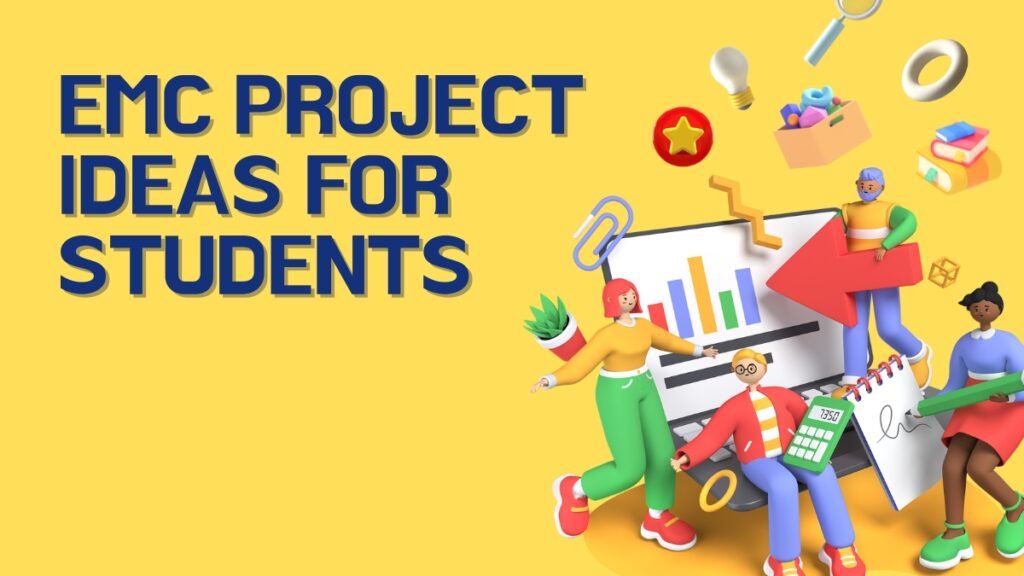Welcome to the EMC Project Ideas for Students! This curriculum is here to help you explore entrepreneurship through hands-on projects.
You’ll learn to:
- Find Opportunities: Spot gaps and come up with new ideas.
- Plan and Create: Develop your ideas into actionable plans.
- Secure Funding: Learn how to raise and manage money.
- Build Your Brand: Create and market your brand.
- Handle Challenges: Navigate the practical aspects of running a business.
Let’s dive in and get started on turning your ideas into reality!
EMC Project Ideas for Students PDF
What is EMC?
EMC, or Entrepreneurship Mindset Curriculum, is designed to foster creativity and leadership in students. It focuses on building skills like problem-solving and risk-taking to help you spot opportunities and innovate. Essentially, EMC aims to prepare you to be a successful entrepreneur.
Importance of entrepreneurship mindset
An entrepreneurial mindset is key for success today. It develops skills that are valuable beyond business:
| Skill | Description |
|---|---|
| Problem-solving | Finding creative solutions. |
| Risk-taking | Embracing and learning from challenges. |
| Leadership | Leading and collaborating effectively. |
| Creativity | Thinking outside the box. |
| Adaptability | Adjusting to change and seizing opportunities. |
| Job creation | Contributing to economic growth. |
EMC in education helps students become innovators and problem solvers, not just job seekers.
Benefits of EMC Projects for Students
EMC projects offer many benefits for students:
| Skill | Description |
|---|---|
| Problem-solving | Tackle complex issues and find solutions. |
| Creativity | Generate new ideas and think innovatively. |
| Leadership | Build teamwork and inspire others. |
| Confidence | Overcome challenges and boost self-belief. |
| Communication | Improve clarity in sharing ideas. |
| Real-world experience | Apply skills in practical projects. |
| Future readiness | Prepare for education and careers. |
| Personal rewards | Potential for satisfaction and financial gain. |
These projects help students gain valuable skills and a mindset for lifelong success.
Understanding EMC
Basic Concepts of EMC
- Innovation: Creating new, valuable ideas.
- Risk-Taking: Making informed decisions with potential risks.
- Creativity: Generating fresh, out-of-the-box ideas.
- Problem-Solving: Overcoming challenges with effective strategies.
These ideas combine to help build an entrepreneurial mindset.
Importance in Real World Applications
An entrepreneurial mindset is valuable in many fields:
In the Workplace
- Innovation: Solve problems and propose new ideas.
- Adaptability: Adjust to new challenges.
- Leadership: Motivate and guide teams.
- Career Growth: Boosts advancement opportunities.
In Different Industries
- Technology: Drives innovation.
- Healthcare: Improves treatments and patient care.
- Education: Enhances learning experiences.
- Non-Profit: Develops funding models and social impact.
It helps individuals excel and adapt in any career.
Key Components of EMC
| Skill | Description |
|---|---|
| Ideation | Generating and exploring new ideas. |
| Business Planning | Creating a strategic plan with market research and financial projections. |
| Marketing | Promoting products through branding and advertising. |
| Financial Literacy | Managing budgets and understanding financial statements. |
These elements help students turn ideas into successful ventures.
Understanding EMC Core Competencies
Core Competencies of the Entrepreneurship Mindset Curriculum (EMC)
| Category | Skill | Description |
|---|---|---|
| Innovation and Creativity | Generating new ideas | Creating novel and valuable concepts. |
| Thinking outside the box | Approaching problems in unconventional ways. | |
| Experimenting and prototyping | Testing ideas to refine and improve them. | |
| Problem-Solving and Decision Making | Identifying challenges | Recognizing and defining problems to address. |
| Analyzing data | Interpreting information to understand issues. | |
| Making informed decisions | Using data and analysis to choose solutions. | |
| Leadership and Teamwork | Inspiring and motivating | Encouraging and energizing team members. |
| Building and leading teams | Forming and guiding effective groups. | |
| Communicating and collaborating effectively | Sharing ideas and working together efficiently. | |
| Risk-Taking and Resilience | Embracing challenges | Welcoming new and difficult situations. |
| Learning from failures | Gaining insights from mistakes and setbacks. | |
| Persisting through obstacles | Continuing efforts despite difficulties. | |
| Market Analysis and Business Planning | Understanding market dynamics | Analyzing industry trends and consumer behavior. |
| Developing strategies | Creating plans to achieve business goals. | |
| Managing finances and resources | Overseeing financial and material assets. |
EMC Project Ideas Based on EMC Competencies
Check out EMC project ideas based on EMC competencies:-
Innovation and Creativity
- Product Design: Create a new product or service.
- Hackathon: Develop solutions to specific problems.
- Business Model Canvas: Design a business model.
- Idea Pitch: Present new ideas.
- Prototype Building: Make and test prototypes.
- Creative Workshop: Generate new ideas.
- Design Thinking: Solve problems with design thinking.
- Innovation Lab: Explore new technologies.
- Concept Testing: Test new ideas.
- Trend Analysis: Predict emerging trends.
Problem-Solving and Decision Making
- Case Study: Analyze and solve real business cases.
- Simulation Games: Make decisions in simulated environments.
- Ethical Discussions: Debate business ethics.
- Decision Workshops: Practice decision-making.
- Scenario Planning: Develop strategies for various scenarios.
- Critical Thinking: Solve complex problems.
- Root Cause Analysis: Find and fix business issues.
- Problem Lab: Work on real business problems.
- Strategy Creation: Develop business strategies.
- Conflict Role-Play: Resolve simulated conflicts.
Leadership and Teamwork
- Student Businesses: Run small businesses as a team.
- Community Projects: Work on local service projects.
- Mentorship: Mentor peers or community members.
- Leadership Workshops: Build leadership skills.
- Team-Building: Strengthen team dynamics.
- Role-Play Leadership: Simulate leadership roles.
- Project Management: Manage group projects.
- Collaborative Work: Work on joint projects.
- Peer Reviews: Give and receive feedback.
- Public Speaking: Present to groups.
Risk-Taking and Resilience
- Failure Analysis: Learn from past failures.
- Pitch Competitions: Present ideas to judges.
- Investment Simulation: Make virtual investment decisions.
- Risk Assessment: Evaluate business risks.
- Resilience Training: Build resilience skills.
- Challenge Projects: Take on challenging tasks.
- Recovery Plans: Develop failure recovery plans.
- Risk Exercises: Engage in risk-taking activities.
- Crisis Simulations: Handle simulated crises.
- Entrepreneurial Diaries: Document experiences with risk.
Market Analysis and Business Planning
- Market Research: Study market trends.
- Business Plans: Create detailed business plans.
- Financial Analysis: Analyze financial data.
- Competitive Analysis: Study competitors.
- SWOT Analysis: Assess strengths, weaknesses, opportunities, and threats.
- Strategy Development: Create growth strategies.
- Consumer Surveys: Conduct and analyze surveys.
- Financial Modeling: Build financial projections.
- Operational Planning: Plan business operations.
- Market Segmentation: Analyze market segments.
EMC Project Ideas for Students
Check out EMC project ideas for students:-
Beginner Level
- Idea Generation: Host brainstorming sessions and use mind mapping.
- Market Research: Conduct basic surveys and interviews.
- Business Model Canvas: Create a simplified business model canvas.
- Pitching: Present ideas in short sessions to classmates.
- SWOT Analysis: Perform a basic SWOT analysis for a new idea.
- Concept Development: Develop and refine initial business concepts.
- Customer Feedback: Collect feedback on early ideas from peers.
- Competitive Analysis: Research competitors and their offerings.
- Value Proposition: Define and articulate a value proposition.
- Product Naming: Create and test names for potential products.
Intermediate Level
- Business Plan Development: Outline a basic business plan.
- Financial Analysis: Perform budgeting and profit/loss calculations.
- Social Media Marketing: Set up and manage social media profiles for a hypothetical business.
- Customer Segmentation: Identify and create customer personas.
- Market Trends Analysis: Analyze current market trends.
- Brand Development: Design basic branding elements like logos and taglines.
- Sales Strategy: Develop a simple sales strategy and tactics.
- Marketing Campaign: Plan and execute a basic marketing campaign.
- Business Operations Plan: Outline operations and management processes.
- Competitor Benchmarking: Compare and contrast with competitors.
Advanced Level
- Market Research Analysis: Conduct thorough market research and analysis.
- Financial Forecasting: Create detailed financial projections and models.
- Product Prototyping: Develop physical or digital prototypes of products.
- Business Pitch Competitions: Compete with a fully developed business plan.
- Startup Simulation: Manage a simulated business through different stages.
- Operational Scaling: Plan for scaling operations and growth.
- Pricing Strategy: Develop and test pricing strategies.
- Marketing Analytics: Analyze the effectiveness of marketing strategies.
- Funding Proposal: Create a proposal for potential investors.
- Customer Journey Mapping: Map out the customer experience and journey.
Expert Level
- Investment Analysis: Evaluate investment opportunities and prepare pitches.
- Global Business Strategy: Develop strategies for international market entry.
- Ethical Decision Making: Address and resolve complex ethical issues.
- Sustainable Business Models: Create environmentally friendly business concepts.
- Mentorship Program: Guide and support younger students or aspiring entrepreneurs.
- Strategic Partnerships: Develop plans for forming strategic business partnerships.
- Exit Strategy: Design an exit strategy for a business venture.
- Regulatory Compliance: Research and ensure compliance with industry regulations.
- Innovation Management: Manage and implement innovation within a business.
- Global Market Research: Conduct research on global market opportunities and challenges.
Resources and Tools for EMC Projects
Essential Resources for EMC Projects
Online Tools and Platforms
- Market Research: Google Trends, Statista, SurveyMonkey, Qualtrics
- Design and Prototyping: Canva, Figma, Sketch, Adobe Creative Suite
- Business Planning: Business Model Canvas, Lean Startup tools
- Financial Analysis: Excel, Google Sheets, financial modeling software
- Project Management: Trello, Asana, Basecamp
- Collaboration: Google Workspace, Microsoft Teams, Slack
Educational Resources
- Online Courses: Coursera, edX, Udemy
- Business Books and Articles: Harvard Business Review, Entrepreneur Magazine
- Mentorship Programs: Local entrepreneurs, incubators, accelerators
- Competitions and Hackathons: Launchpad, Y Combinator
Entrepreneurial Communities
- Networking Events: Industry conferences, meetups
- Incubators and Accelerators: Local startup support programs
- Online Forums and Communities: Reddit, Quora, industry-specific forums
Financial Support
- Crowdfunding: Kickstarter, Indiegogo
- Investors: Angel investors and venture capitalists
Using these resources helps students access valuable information, tools, and support to enhance their EMC projects.
Integrating EMC into Different Academic Disciplines
STEM
- Science: Solve scientific problems with innovative ideas.
- Technology: Develop tech startups or apps.
- Engineering: Use design thinking for engineering tasks.
- Mathematics: Apply math to business and finance.
Humanities and Social Sciences
- History: Study influential entrepreneurs.
- Language Arts: Create pitches and marketing materials.
- Social Studies: Explore economic systems and global business.
- Philosophy: Discuss business ethics.
Business and Economics
- Business: Apply entrepreneurship in marketing and management.
- Economics: Use economic principles in business.
- Accounting: Analyze financial data for decisions.
Arts and Design
- Art: Design products and branding strategies.
- Music: Develop business models for music.
- Design: Focus on user-centered design.
Integrating EMC helps students understand entrepreneurship across different fields and prepares them for varied careers.
Assessing EMC Project Outcomes
To understand the impact of EMC projects and make improvements, consider these key metrics and methods:
Key Performance Indicators (KPIs)
- Student Engagement: Track interest, participation, and motivation.
- Knowledge Acquisition: Measure understanding of entrepreneurial concepts.
- Skill Development: Evaluate application of entrepreneurial skills.
- Project Outcomes: Assess the quality, creativity, and feasibility of projects.
- Student Confidence: Gauge self-belief in entrepreneurial abilities.
Assessment Methods
- Surveys and Questionnaires: Collect feedback from students, teachers, and parents.
- Rubrics: Use scoring criteria to evaluate project work.
- Portfolios: Gather work samples to show progress.
- Observations: Watch student behavior and interactions.
- Interviews: Conduct interviews to gain deeper insights.
Examples of Assessment Tools
- Pre and Post-Project Surveys: Measure changes in attitudes and knowledge.
- Evaluation Rubrics: Assess project deliverables.
- Self-Reflection Journals: Track personal growth and learning.
- Peer Evaluations: Review teamwork and collaboration.
Using these methods helps educators understand and improve the effectiveness of EMC projects.
Overcoming Challenges in EMC Projects
Challenges and Solutions for EMC Projects
Common Challenges
- Resources: Limited funding, personnel, or materials.
- Time: Balancing with other academic work.
- Engagement: Difficulty motivating students.
- Fear of Failure: Hesitancy to take risks.
- Experience: Lack of business familiarity.
Solutions
- Optimize Resources: Use what you have, seek partnerships.
- Manage Time: Prioritize and set deadlines.
- Boost Engagement: Offer incentives and align with interests.
- Encourage Risk-Taking: Promote learning from mistakes.
- Provide Guidance: Offer expert support.
Additional Strategies
- Collaborative Learning: Foster peer learning and teamwork.
- Real-World Connections: Invite industry professionals.
- Flexible Structure: Adapt projects as needed.
- Continuous Evaluation: Track progress and adjust.
- Celebrate Success: Recognize and reward achievements.
These strategies help overcome challenges and support successful EMC projects.
What is the best business to start as a student?
Best Business Ideas for Students
Leveraging Skills
- Tutoring: Help others in subjects you know well.
- Freelancing: Offer services like writing or graphic design.
- Online Teaching: Create courses for platforms like Udemy.
Student Life Opportunities
- Event Planning: Organize campus events.
- Food Services: Try food trucks or catering.
- Resale Business: Buy and sell items online.
Online Options
- Blogging/Vlogging: Share interests and earn from ads.
- Dropshipping: Sell products online without inventory.
- E-commerce: Sell your own products.
Key Considerations
- Passion: Choose something you like.
- Time Management: Balance business and studies.
- Financial Planning: Start small and reinvest.
- Legal and Tax: Know the basics of business laws.
- Networking: Build connections with customers and mentors.
Experiment and adjust as needed to build your entrepreneurial skills.
How to start a business as a student in India?
Starting a Business as a Student in India
Identify Your Idea
- Passion: Choose what excites you.
- Skills: Use what you know.
- Market Gap: Find an unmet need.
- Scalability: Think about growth.
Create a Plan
- Research: Know your audience and competitors.
- Finance: Estimate costs and revenue.
- Structure: Pick a business type (sole proprietorship, partnership, LLP).
- Operations: Plan daily activities.
Secure Funding
- Savings: Use your own money.
- Crowdfunding: Raise funds online.
- Investors: Seek angel investors or venture capital.
- Government: Explore loans and subsidies.
Legal and Compliance
- Register: Officially register your business.
- Licenses: Get necessary permits.
- Taxes: Register for GST and income tax.
- Laws: Follow legal regulations.
Build Your Brand
- Identity: Create a strong brand.
- Online: Set up a website and social media.
- Network: Connect with potential customers and partners.
Market Your Business
- Digital: Use social media and online ads.
- Traditional: Try print media and local ads.
- Customer Relations: Build strong connections with customers.
Build Your Team
- Hire: Bring in skilled people if needed.
- Outsource: Delegate tasks if necessary.
- Interns: Offer internships for extra help.
Manage Finances
- Records: Keep accurate financial records.
- Cash Flow: Track money coming in and going out.
- Taxes: Plan for tax liabilities.
Tips
- Start Small: Begin with a simple version of your idea.
- Learn: Stay updated on industry trends.
- Mentor: Get guidance from experienced individuals.
- Adapt: Learn from mistakes and adjust as needed.
Following these steps can help you succeed as a student entrepreneur in India.
Conclusion
Entrepreneurship begins with a simple idea and grows with hands-on experience. EMC projects give students a great chance to explore their potential, build important skills, and make a real impact. From brainstorming ideas to launching ventures, these projects help students become future leaders.
By bringing EMC into education, we encourage students to think creatively, solve problems, and grab opportunities. Remember, every successful entrepreneur started with just one idea. So, spark your entrepreneurial spirit, explore your options, and start your journey!


